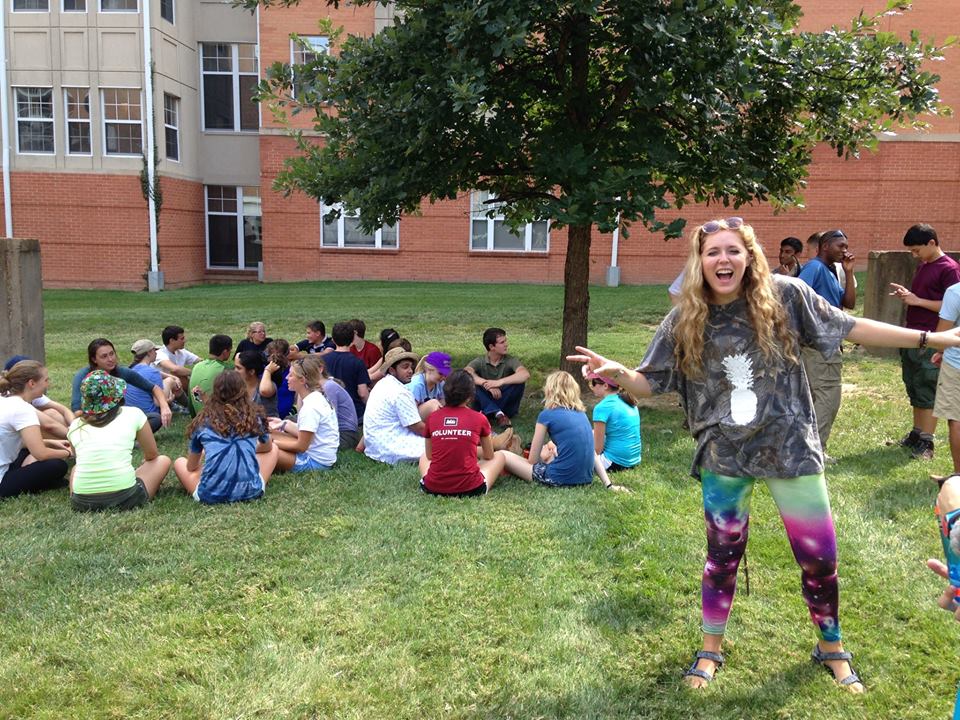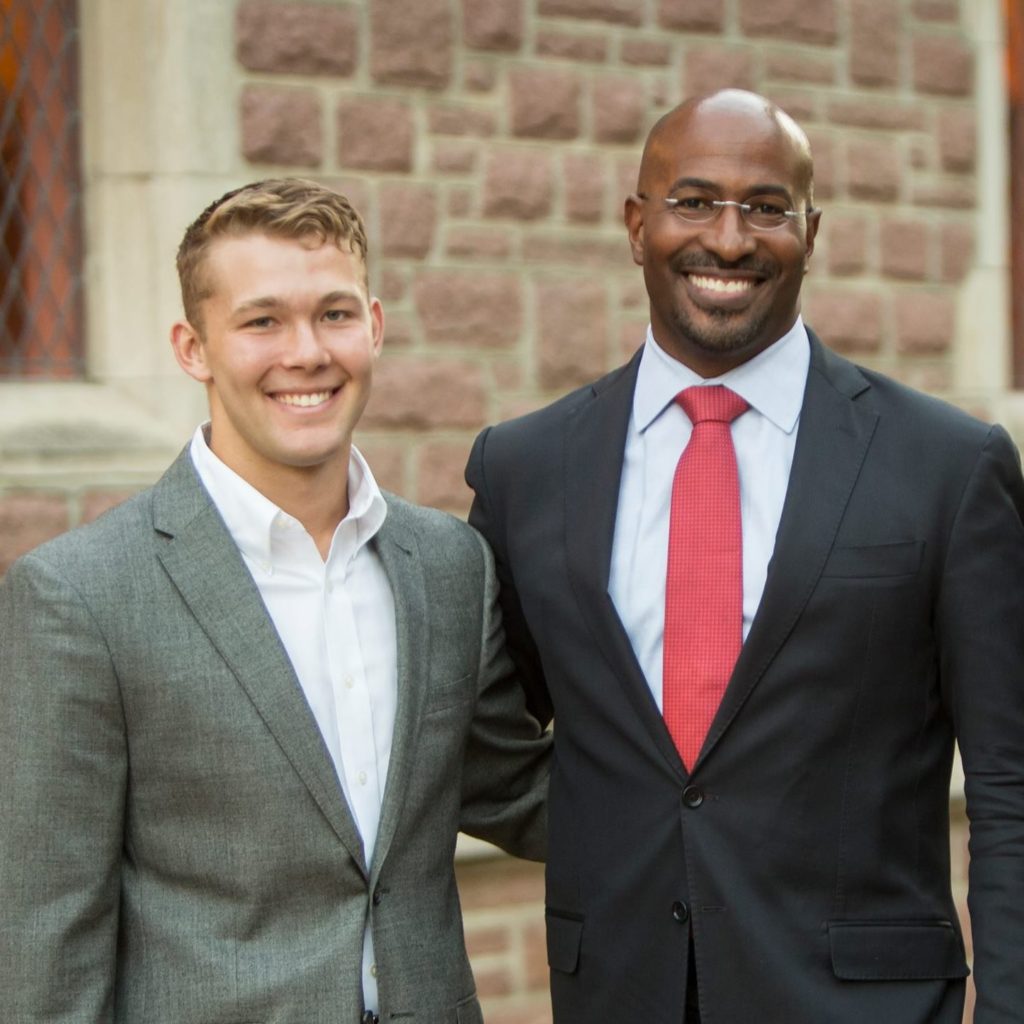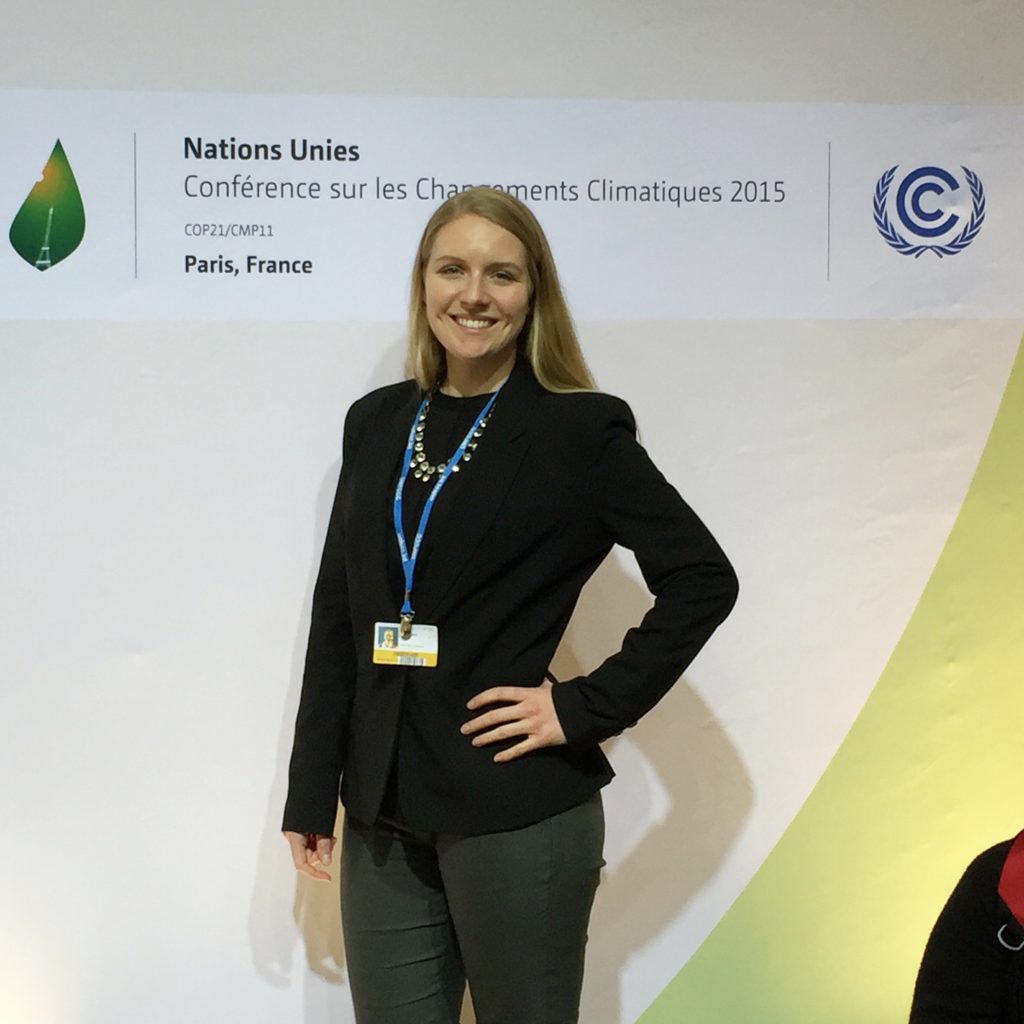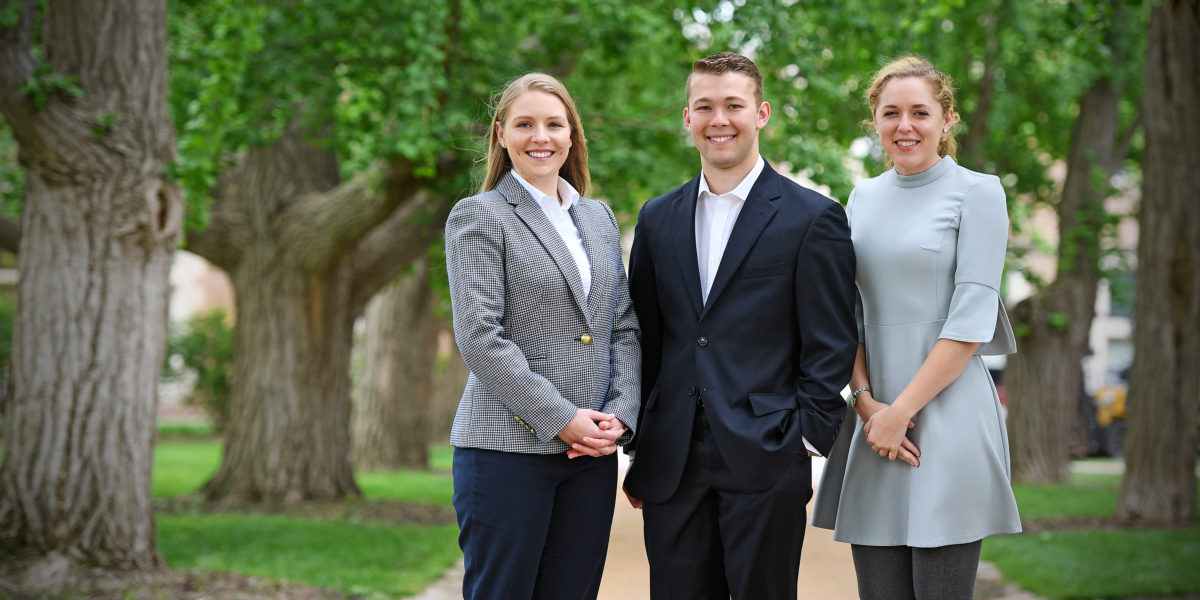Sustainability champions Nick Annin, Elise Fabbro and Nicola Salzman graduate this month from Washington University in St. Louis poised to fight the globe’s most pressing problem with a powerful tool: the free market.
 Though these students support laws and treaties that protect the environment, they also recognize that markets can move faster. And, in this battle, every second counts.
Though these students support laws and treaties that protect the environment, they also recognize that markets can move faster. And, in this battle, every second counts.
“There is a myth that the economy and the environment are inherently at odds,” said Annin, a senior in the environmental studies program in Arts & Sciences. “We know, in fact, the opposite is true. A healthy economy depends on a healthy environment.”
The three advocates share much in common, including an early admiration for former vice president Al Gore. Each said Gore’s 2006 documentary, “An Inconvenient Truth,” transformed climate change from a vague cause for concern into, for each of them, a call to action.
Annin remembers watching the film in fourth grade with his father Peter Annin, a renowned environmental journalist. Annin felt as if he might vomit.
“All my life, I had gone camping and the woods were my home,” said Annin, a native of Madison, Wis. “The idea that all of that was threatened was horrifying.”
Salzman, also a senior in environmental studies in Arts & Sciences, was in high school in Boston when she read a book version of “An Inconvenient Truth.” She remembers looking at the adults around her thinking, “Wait? You knew about this? And you’re not doing everything you can to fix it?”
And Fabbro, a law student, remembers her Palo Alto, Calif., high school inviting Gore to deliver his “Inconvenient Truth” presentation live.
“I walked out of there changed,” Fabbro said. “Since then, the environment and our impact on it is what I think when I go to bed at night, and when I wake up in the morning.”
In 2013, they would all arrive at the same time at the Danforth Campus. Annin came to play football for Coach Larry Kindbom; Salzman liked the campus culture; and Fabbro transferred to the School of Law when an admissions officer serendipitously called the day she learned her current program was losing two environmental law experts.
Once here, they all applied to participate in the international climate negotiation seminar. They also each attended the global climate talks, known as the United Nations Framework Convention on Climate Change Conferences of the Parties (COP) as a delegate from Washington University.
It’s a unique opportunity, one that few universities extend to undergraduates, said Beth Martin, senior lecturer in environmental studies in Arts & Sciences. At the conferences, the students tracked specific articles of the agreement such as mitigation or finance, and attended negotiations and forums featuring climate leaders such as Gore and former United Nations secretary general Ban Ki-moon.
“They see how diplomacy works and how words matter,” said Martin, who teaches the international climate seminar and leads the Washington University observer delegation. “The students also meet people whose daily lives and homes are profoundly impacted by climate change. It is both an incredible educational and emotional experience.”
All three students consider the conference the capstone of their academic careers. “We participated in history,” said Fabbro, who attended COP 21 in 2015 in Paris with Annin.
“I asked myself over and over again, ‘How am I here?’” said Salzman, who attended COP 22 in Marrakesh in 2016. “It was an experience unlike one I could ever have in a classroom.”
Fabbro, Annin and Salzman left their respective conferences buoyed. The innovations of engineers, the research of scientists, the resolve of diplomats — the gains were real. And yet each returned, more convinced than ever, that global talks and international treaties can only take us so far. The private sector can — and must — play a pivotal role.
Here’s a closer look at Washington University’s leading sustainability champions and their vision for world for a healthy environment and economy:
Speaking the language
Salzman learned early that sustainability pays.
As a little girl, she put a cardboard box, decorated with a globe, in her dad’s office for aluminum cans. She would then trade the cans for money at her local grocery store.
“I would go there with these huge bags of sticky cans and walk out with a treat,” Salzman said.
Fast forward a decade. As a Gephardt Institute Goldman Fellow, Salzman helped create an energy efficiency master plan for Saint Louis Public Schools, which spends more than $10 million annually for utilities. After a thorough analysis of district buildings, she identified more than $1 million in savings. The district has implemented many of the recommendations such as switching to LED lights and kicking on cooling systems later in the morning.
“This district’s priority is, as it should be, on academics,” Salzman said. “But I showed that a focus on sustainability can mean more money for your core mission.”
Next, Salzman helped the community of University City, Mo., build a commercial recycling program for the Delmar Loop. When Salzman started, only three businesses had joined the free program. Now, 65 businesses participate.
University City Senior Project Manager Jennifer Wendt estimates the program has diverted 27 percent of the Loop’s waste from the landfill. That’s a win for businesses, which get free recycling. It’s also a win for University City, which pays less in landfill fees. And, of course, a win for the earth. The program will now expand to the Olive Boulevard business district.
“To me, saving the planet should be enough,” Wendt said. “But Nicola knows how to speak the business owners’ language. She had terrific success explaining how this program would help their bottom line.”

Salzman hopes to continue that work after graduation as an associate consultant at Bain & Company in Chicago. Her goal is to help businesses save money through smart, sustainable practices and to support Bain’s growing alternative energy practice.
Ultimately, she would like to work for a clean power company or an alternative energy interest group. The technology is there, she said, but government subsidies and lower taxes for the fossil fuel industry put alternative fuels at a disadvantage.
“It feels like defeat after defeat when hear about actions to undermine the market for clean power,” Salzman said. “It can be easy to lose hope, but I chose to stick to my values and my goals. I know we’ll get there.”
Building relationships
Tofu is gross, and Annin knows it.
“I’m never going to say, ‘Hey everyone, meat is literally the worst thing you can eat. It’s ruining the planet. If you care about the environment, here is your option — tofu,” Annin said.
“In my experience, scolding doesn’t work. You can’t make sustainability a burden.”
That’s why Annin is a strong advocate for incentive-based solutions to climate change. Through his work at the university’s Office of Sustainability, Student Union and Net Impact, a national club that promotes sustainability in business, Annin organized events and programs that made sustainability simple, even fun. He hosted green jobs advocate Van Jones at Graham Chapel, organized Sustainable Harvest Festival and helped departments find easy ways to reduce energy and waste.
“Nick cares about bringing people in,” said Matthew Bakko, Gephardt Institute research manager. “He knows the way to influence people is to form relationships and have a conversation. We don’t see enough of that in the current debate.”
While he was in Paris in 2015, Annin was charged with observing the negotiations for adaptation and loss and damage. But he got his real education in climate politics while waiting in line for coffee or roaming the corridors of the massive convention hall.
“Every night, they would print the most recent document and hand it out. It was like going to a newsstand in the ’50s,” Annin said. “The diplomats and their staff would pour over them, and I would stand behind people and listen. That’s how you could find out how China or the small island states felt.”
Annin has little faith in government to get climate action right. He said it’s too slow, too bureaucratic and too laden with political baggage. He has learned that the market, with its obsession for quarterly returns, is not much better. Right now, companies don’t pay for the water and air pollution they produce. Those externalized costs are offloaded onto private citizens and local governments. Meanwhile, no value is given to the soil for purifying our water or to trees for removing carbon from the air.

“Companies use the cheapest fuel because they can make society pay for the negative repercussions,” Annin said. “An economic system allows those costs to be externalized, while valuing natural resources at zero is bound to have environmental issues.”
But Annin said markets are slowly recognizing that the environment is an essential part of the economy and wants to pursue a career in sustainable investment after completing a master in finance degree at Olin Business School. He is part of growing movement that believes that sustainable capitalism will deliver greater returns over the long run.
“Investment firms have the power of capital and can make signals about what they think is valuable and why,” Annin said. “You are starting to see investors say that degrading natural resources is not only environmentally unsustainable, it’s economically unsustainable.”
The three ‘P’s
Scientists have figured out how to power our refrigerators with wind, and our Xboxes with sunlight.
But that’s not the hard part. Paying for it is. Enter Fabbro.
“The biggest hurdle remaining, in many cases, is access to capital,” Fabbro said. “Green enterprises require new financial structures and creative legal instruments to get started. That’s where I, as a new sort of corporate lawyer, hope to make a difference.”
In Paris, Fabbro was heartened by the large number of investment bankers ready to discuss how private sector investment can support green technologies and alternative fuels.
“Some of the bankers were environmentalists; some were not,” Fabbro said. “But they all care about the best investment opportunities. It’s their job to know where the market is heading and to adapt. And more and more, you see asset managers investing in companies that will have a positive effect on the environment. They believe those businesses will perform better in the long run and, in fact, they already do.”
Fabbro decided to pursue law to follow in the footsteps of her hero Al Gore. To her, clean water and clean air are human rights.
“And the best way to ensure human rights is through the law,” Fabbro said. “Laws create and protect justice.”
At Washington University, Fabbro worked for the Interdisciplinary Environmental Clinic and continued her education in environmental science. She also discovered a new passion: tax law. The more she learned about corporate law, the more she realized she needed to earn an MBA.
“I could talk to you about soil horizons and the effects of different chemicals, but I couldn’t tell you about the business side,” Fabbro said. “To be the best lawyer I could be, I knew I needed to understand all angles of green business.”

Nancy Staudt, dean of the School of Law and the Howard & Caroline Cayne Professor of Law, said Fabbro’s commitment to justice and her nuanced understanding of both environmental and corporate law prepares her to serve our changing economy.
“Elise has the professional and personal skills to play a leadership role in addressing climate change and achieving sustainability,” Staudt said. “She uses her training in law and business, and her thoughtful, energetic, inclusive personal traits, to seek creative yet pragmatic solutions to some of our biggest challenges.”
After graduation, Fabbro will return to California to take the bar exam. She then plans to work on renewable energy financing.
“It’s all about the three Ps — profit, people and planet,” Fabbro said. “We need not sacrifice one for the others.”

Comments and respectful dialogue are encouraged, but content will be moderated. Please, no personal attacks, obscenity or profanity, selling of commercial products, or endorsements of political candidates or positions. We reserve the right to remove any inappropriate comments. We also cannot address individual medical concerns or provide medical advice in this forum.